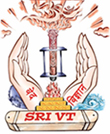 info.srivt@gmail.com
info.srivt@gmail.com 08632950470 / 08634010911 / 9493936388
08632950470 / 08634010911 / 9493936388
Nanotechnology is the art and science of manipulating matter at the nanoscale (down to 1/100,000 the width of a human hair) to create new and unique materials and products…with enormous potential to change society. Nanoscience is an ‘interdisciplinary science,’ which involves the concepts of more than one discipline, such as biology, chemistry, physics, biochemistry, etc. Nanoscience is thus a ‘horizontal-integrating interdisciplinary science that cuts across all vertical sciences and engineering disciplines. Nanotechnology is the application of nanoscience to ‘practical’ devices. Nanotechnologies are based on the manipulation, control, and integration of atoms and molecules to form materials, structures, components, devices and systems at the nanoscale. All industrial sectors rely on materials and devices made of atoms and molecules are in benefits . Nanotechnologies have application in every field. In reality, as with any new technology, the ‘cost versus added benefit’ relationship will determine the industrial sectors that will mostly benefit from nanotechnologies.
Research Areas:
- Synthesis, characterization of nanoparticles and their applications.
- Nanomaterials in therapeutic and diagnosis.
- Biosensors; thin film and nanocomposites based biosensors.
- Functionalization of Nano Materials and their Industrial Applications.
- Graphene and its applications.
Techniques known :
- Cyclic Voltammetry measurements on an Autolab potentiostat /galvanostat
- Ultraviolet–visible spectroscopy
- Centrifuge machine
- Atomic Force Microscope (AFM)
- Scanning Electron Microscope (SEM)
- Fourier transform infrared spectroscopy (FTIR)
- Raman
Join us as member to make again our Bharat as "Viswa Guru"
Srimaharshi Aarshavijnanadi Gurukula Mahavidyalaya (Virtual University)


